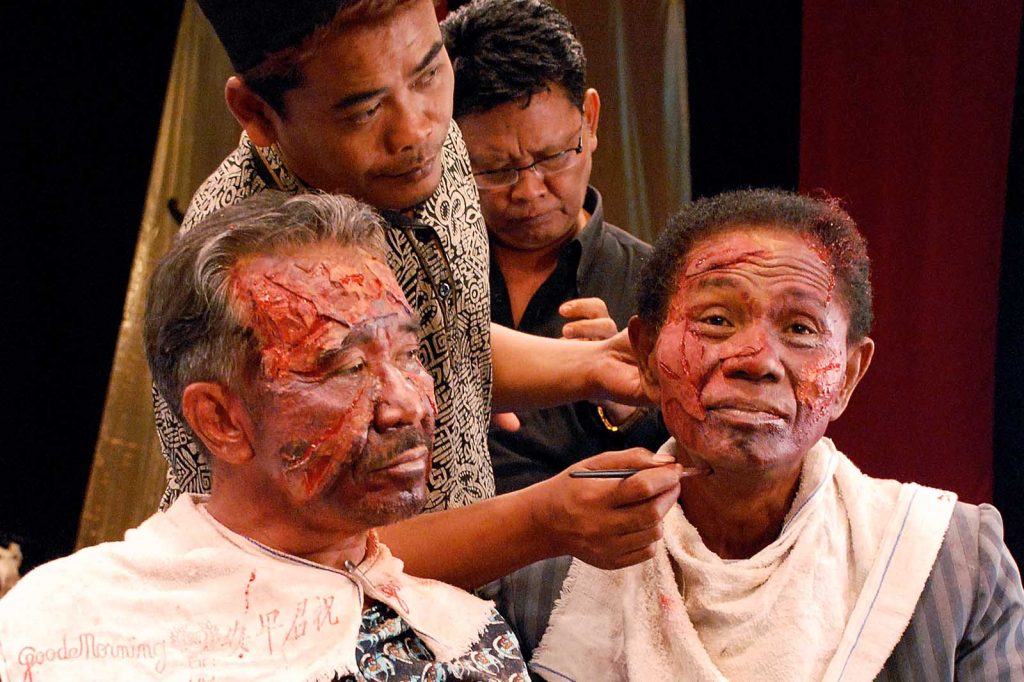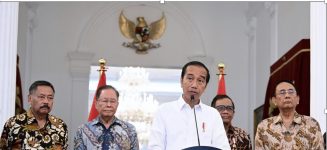Joshua Oppenheimer’s stunning film ‘The Act of Killing’ (2012) has been responded with great astonishment across the world. A new genre of cinematography, the documentary, which has recently been screened at festivals in the Scandinavia, Berlin, London and The Hague, provides unique insights into Indonesia’s massacre of 1965-1966 – one of the greatest in history.
A documentary of film-making set in scenes by the perpetrators themselves, it’s the product of professional skills and years of intensive collaboration with the perpetrators-cum-actors. It reveals what anthropologists called ‘emic’ i.e. what the participants of the society think, in contrast to ‘etic’ i.e. the outsiders’ views.
It’s a reconstruction, not of full historic events, but of the killers’ world view, their state of mind, acts and sentiments such as when Oppenheimer found them among the Pemuda Pancasila (Pancasila Youth), a youth mass organization-turned-death-squad of North Sumatra, in the mid-2000s.
It tells you how they did the killing while dancing ‘cha, cha, cha’; that killing communists was legitimate to achieve this-world-happiness and heaven paradise, where they were to dance with beautiful angels; and about life among proud urban gang of premans (thugs)-cum-killers’ in pursuit of power and money.
However, most of the 1965-1966 almost-a-million killings actually happened in the countryside of Java and Bali perpetrated by various mass organizations guarded as they were by some Army units – who were not visible in the film.
Yet, the film does hit an important point as it portrayed the secured life of known mass murderers, who remain free of any social and legal sanctions.
The two-hours and 38 minutes film raises, in my view, pertinent questions as to how could the killers do the killing so enthusiastically, so cold bloodedly, then be proud of what they performed, and were protected, forty years on, sometimes even hailed as heroes of a sort, by the state and society.
This inevitably will force many to reflect and ask what’s ‘wrong’ with these people, what sort of society it was, or still is, and why did the state allow, and is still allowing, what has amounted to a celebration of violence and impunity?
Michael Foucault (1991) would have seen it as a failure of state and civilization. It shows how modernity process failed to move people away from a brute power – like executions of criminals – as public spectacle. A failure, that is, to discipline the society. But how could the (post) 1965-Indonesian state be said a “failure” when it was the state itself i.e. its military apparatuses that intentionally led, purposively encouraged and justified the killings?
At this point, while recognizing the state of a civilization-in-trouble, it may be noted how the killers’ emic may resemble Hannah Arendt’s (1963) much referred discourse on the banality of evil. Under Nazism, mass killings might be internalized as deeds of obedience and dedication that turned violence into banal things. It’s as if totalitarianism would automatically dictate reason to be dissociated from banality.
Human society, though, is a complex process. The moments Anwar Congo, the film main protagonist, passionately took a great care of his grandchild while they were feeding ducks, remind one strongly to Francis F. Coppola’s ‘The Godfather’ (1972) scene in which the dying Great Godfather, like any loving grandfather, played with his grandchild in the garden.
There are more of such graphic yet profound scenes. A woman who joyfully played with a penis cut off from a dead communist; Adi Zulkardy, a cool-blooded killer, who enjoyed life at a luxury mall while arguing “I know killing is wrong, but if I have to do it, so be it! After all, we are the winner, aren’t we?”; and Anwar Congo, another communists killer, who suddenly realized what he did when he, acting as if he were a communist, was ‘interrogated’ and ‘tortured’. At last, he suffered from nightmares of guilty feeling and felt remorseful when some cognitive dissonance intruded his mind only to despise his own fate and vomited at the very site where he used to torture and kill communists.
These were all men and women who went through normal daily life. Such were dimensions of human and humanity even among most violent bosses when tempted and misled by power-that-is. For, they are, in fundamental sense, human being — just like you and me.
In other words, evil seems everywhere, but is not born out of any circumstances.
Once we acknowledge this, two things thus need to be noted. First, politicians, historians and observers need to take serious efforts to reflect on the questions that have troubled this nation. What is it, what sort of continuities, if any, of conditions, what specific circumstances in the history of Indonesia that shaped social structures, with certain patterns of culture and behavior, enabling many Anwar’s and Adi’s to do what they did? In short, what’s gone ‘wrong’ with this nation?
Second, the film should be an eye opener for generations to come, in particular ones that grew up with New Order myths and propaganda.
A new documentary ‘Women and the Generals’, now screened in the U.S., has reportedly revealed some women had been trained by the Army to testify that “there were mutilations enacted by the dancing Gerwani women” at Lubang Buaya on Sept. 30, 1965 – a false accusation that provoked mass killings.
Most Indonesians abroad – including R.I. Ambassador Made Juniata Sastrawan, who attended the screening in Stockholm – liked ‘The Act of Killing’ and many – like former legislator Nursyahbani Katjasungkana in The Hague – welcomed it as a serious warning for the state to end its power game – proxy game, that is – with premans.
Above all, with the growing interest of media, books, novels and public events at home on the dark pages of our history, the film should contribute to greater public awareness to call for ‘Never again 1965!’ and push toward a real search for truth and reconciliation.
It should – as former human rights commissioner Stanley Adi Prasetyo argued – encourage the President to offer apology on behalf of the nation – as Nelson Mandela did – to the victims.
President Susilo Bambang Yudhoyono, now in his last term, said on May 13, 2011,he would agree to resolve past rights violations and to offer apology, but he appeared to have canceled it following a subsequent meeting with a delegation of politicians and religious leaders led by Gen. ret. Solichin G.P. who urged him not to do so.
Thus, back to square one. So, here is the question yet again: what’s gone ‘wrong’ with this nation?




One Reply to “The ‘1965’ killers: What’s gone ‘wrong’ with Indonesia?”